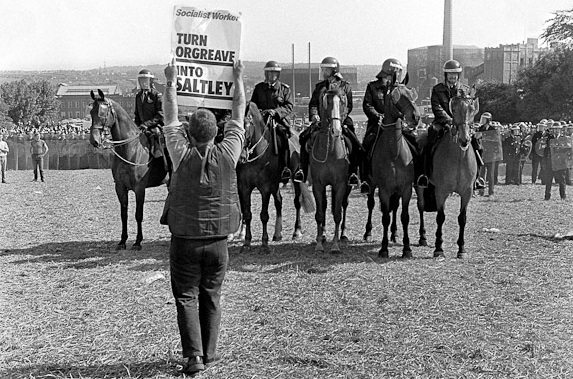Labour draft manifesto: pledges to reverse legal aid cuts, cap court fees & open Orgreave inquiry

Pic by Martin Shakeshaft, from his Strike84 collection
A Labour government would reinstate some of the 2013 legal aid cuts, cap court fees and open an inquiry into the 1984 ‘Battle Orgeave’ clash between miners and the police, according to a draft manifesto leaked yesterday. Access to justice was being ‘eroded’ by ‘the withdrawal of legal aid, by the removal of appeal rights, by the delays arising from over-crowded courts and tribunals, and by the costs of fees acting as a barrier to justice’, it said.
The draft contained a pledge to recruit 3,000 more prison officers and 10,000 more police officers. ‘Our criminal justice system is not working,’ it said. ‘Prisons are overcrowded and re-offending rates are too high.’ Prisons should never be ‘a substitute for failing mental health services, or the withdrawal of funding from drug treatment centres’, it continued.
The manifesto promised a review of the Prevent counter-terrorism strategy which had ‘the potential to drive a wedge between the authorities and entire communities’. ‘Some feel they have been unfairly targeted and singled out because of some failings in Prevent,’ it said.
There was an explicit pledge to ‘consider’ the recommendations of the Bach commission on access to justice which is looking at reinstating public funding for social welfare law, some debt and family cases as well as a radical reduction in administration costs and the role of the Legal Aid Agency. The independent commission, which is supported by Labour, published its interim report at the end of last year revealing a justice system (in its words) ‘creaking at the seams’. The party’s 2015 manifesto omitted any reference to legal aid.
The draft said that justice was ‘becoming the preserve of the rich – those who can afford a lawyer and to go to the courts. ‘For the ordinary man or woman, for the football fan, the striking worker, the environmental activist, the trade unionist, the disability benefit claimant – for them, for us – all too often, justice is denied and the truth is covered up,’ it said. A Labour government would campaign for ‘full inquiries into historic injustices, as we did for Hillsborough, and in government we will open inquiries into the scandal of contaminated blood, Orgreave, blacklisting, and we will release all papers relating to the Shrewsbury 24’.
‘Justice is becoming the preserve of the rich. Those who can afford a lawyer and to go to the courts. For the ordinary man or woman, for the football fan, the striking worker, the environmental activist, the trade unionist, the disability benefit claimant for them, for us, all too often, justice is denied and the truth is covered up. Labour will campaign for full inquiries into historic injustices, as we did for Hillsborough, and in government we will open inquiries into the scandal of contaminated blood, Orgreave, blacklisting, and we will release all papers relating to the Shrewsbury 24.’
Draft Labour Party manifesto
According to the justice policy, a Labour government would re-establish legal aid for private family law. It called the consequences of its withdrawal ‘shameful’ especially the requirement for ‘victims of domestic abuse to pay doctors for certification of their injuries’. It would also reintroduce public funding for judicial review which, the draft said, was ‘an important way of holding government to account’. ‘We believe that judges should not be denied the opportunity to check excessive abuse of effective power by the establishment for the sake of a few pounds.’
On court fees, Labour would ‘not prohibit the courts from raising monies to provide services’ but introduce ‘a ratio to establish the maximum difference between actual costs and charges levied’.







